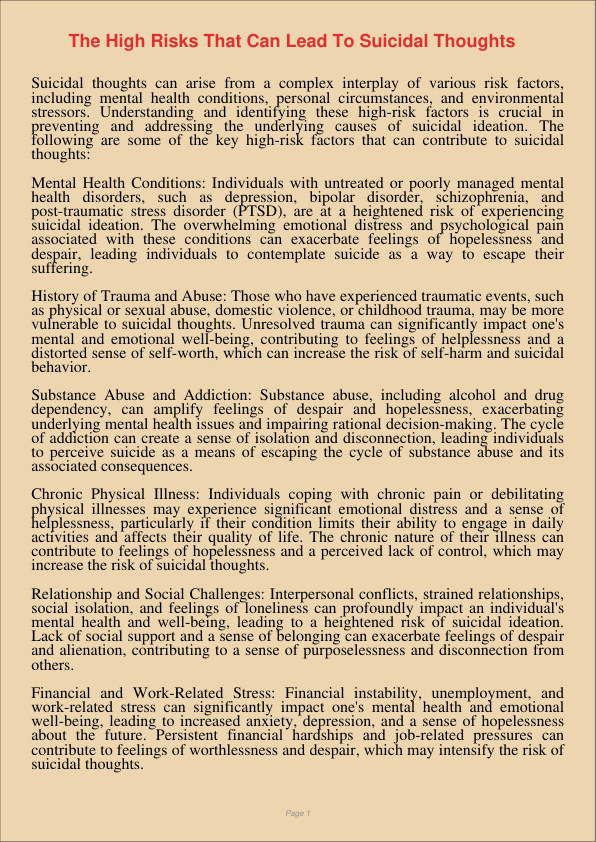The High Risks That Can Lead To Suicidal Thoughts
Jan 8, 2024
suicidal thoughts
high risks
Education
History

Suicidal thoughts can arise from a complex interplay of various risk factors, including mental health conditions, personal circumstances, and environmental stressors. Understanding and identifying these high-risk factors is crucial in preventing and addressing the underlying causes of suicidal ideation. The following are some of the key high-risk factors that can contribute to suicidal thoughts:
Mental Health Conditions: Individuals with untreated or poorly managed mental health disorders, such as depression, bipolar disorder, schizophrenia, and post-traumatic stress disorder (PTSD), are at a heightened risk of experiencing suicidal ideation. The overwhelming emotional distress and psychological pain associated with these conditions can exacerbate feelings of hopelessness and despair, leading individuals to contemplate suicide as a way to escape their suffering.
History of Trauma and Abuse: Those who have experienced traumatic events, such as physical or sexual abuse, domestic violence, or childhood trauma, may be more vulnerable to suicidal thoughts. Unresolved trauma can significantly impact one’s mental and emotional well-being, contributing to feelings of helplessness and a distorted sense of self-worth, which can increase the risk of self-harm and suicidal behavior.
Substance Abuse and Addiction: Substance abuse, including alcohol and drug dependency, can amplify feelings of despair and hopelessness, exacerbating underlying mental health issues and impairing rational decision-making. The cycle of addiction can create a sense of isolation and disconnection, leading individuals to perceive suicide as a means of escaping the cycle of substance abuse and its associated consequences.
Chronic Physical Illness: Individuals coping with chronic pain or debilitating physical illnesses may experience significant emotional distress and a sense of helplessness, particularly if their condition limits their ability to engage in daily activities and affects their quality of life. The chronic nature of their illness can contribute to feelings of hopelessness and a perceived lack of control, which may increase the risk of suicidal thoughts.
Relationship and Social Challenges: Interpersonal conflicts, strained relationships, social isolation, and feelings of loneliness can profoundly impact an individual’s mental health and well-being, leading to a heightened risk of suicidal ideation. Lack of social support and a sense of belonging can exacerbate feelings of despair and alienation, contributing to a sense of purposelessness and disconnection from others.
Financial and Work-Related Stress: Financial instability, unemployment, and work-related stress can significantly impact one’s mental health and emotional well-being, leading to increased anxiety, depression, and a sense of hopelessness about the future. Persistent financial hardships and job-related pressures can contribute to feelings of worthlessness and despair, which may intensify the risk of suicidal thoughts.
Recognizing these high-risk factors and implementing effective preventive measures, such as early intervention, access to mental health support services, and fostering a supportive and empathetic environment, is crucial in addressing the underlying causes of suicidal ideation and providing individuals with the necessary support and resources to promote their mental and emotional well-being. It is essential to prioritize mental health awareness, destigmatize seeking help, and foster open and nonjudgmental conversations about suicidal ideation and mental health challenges to create a supportive and compassionate society that values and prioritizes individual well-being and emotional resilience.